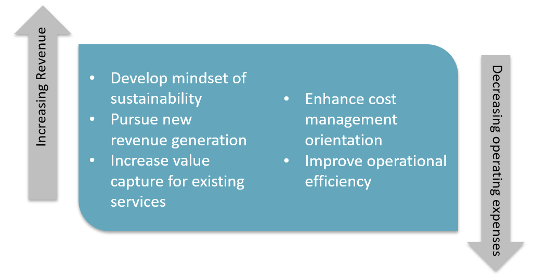Adopting a social enterprise model for sustainable success: the DR NGO experience
In the Dominican Republic, SHOPS Plus has spent the last two years working with four leading NGO providers of HIV services as they began to transition to a social enterprise model. The impetus for this transition comes as donors prepare to withdraw financial support from the country, requiring the NGOs to identify new domestic revenue sources that allow them to continue serving key and priority populations. The NGOs have made significant progress in increasing revenue and decreasing operational expenses while keeping out-of-pocket payments for HIV services minimal. The success suggests that this may be a promising model for NGOs in other countries facing similar challenges.

Recognizing the value of a social enterprise model to support sustainability
NGOs are important actors in the DR’s national HIV response, serving nearly 40 percent of people living with HIV on treatment under the national HIV care program with a focus on key and priority populations such as men who have sex with men and Haitian migrants. The NGOs have historically relied on donor funding to provide free services to their target clients, receiving on average almost 80 percent of their funding from donors.
In looking at the pressing need of the NGOs to ensure their sustainability, SHOPS Plus identified a possible solution: support them to adopt a social enterprise model. This model is promising because it allows the NGOs to take advantage of the country’s economic growth and private sector-friendly business environment to generate the revenue needed to continue offering HIV services.

Identifying and supporting NGOs to adopt a social enterprise model
SHOPS Plus conducted an assessment to identify four NGOs providing HIV services that were well suited to make the transition based on their clinical, financial, and management practices. The NGO’s were CEPROSH, Centro de Orientation E Investigacion Integral (COIN), Clinical de Familia, and Instituto Dominicano de Estudios Virológicos. This kicked off a two-year process focused on the dual goals of increasing revenue and decreasing operating expenses. First, SHOPS Plus conducted a series of site visits to understand challenges and opportunities for each facility. Second, the project developed tailored business and marketing plans to improve efficiencies and introduce new revenue generating services that could cross subsidize HIV services. Third, SHOPS Plus provided technical assistance to operationalize the project’s recommendations and implement the business and marketing plans. This included contracting with the national health insurance agency (SENASA) to access insurance payments for HIV services that the NGOs had previously been offering free of charge.

Analyzing NGO successes and remaining challenges
At the end of two years, SHOPS Plus conducted final site visits to analyze the NGOs’ progress. The project found two major successes. First, the NGOs had made significant strides in implementing new revenue generation opportunities. To date, the three NGOs that contracted with SENASA have collectively been reimbursed almost $77,000 for HIV services provided. Second, the NGOs’ staff have shifted their focus to long-term sustainability, positioning them well to seek out additional revenue generation opportunities in the future. As Mina Halpern, executive director of Clínica de Familia explained, “Now, more than ever, we need to depend on ourselves to generate the revenue that we need to survive and continue to provide quality care.”
While the NGOs are all making considerable progress implementing the new social enterprise model, each continues to face challenges. Some NGOs are experiencing workforce and physical space constraints, making it difficult to implement recommendations provided by SHOPS Plus. Others are struggling to make patients recognize the value of services they previously received free of charge. These challenges are compounded by the COVID-19 pandemic, which has increased demand for health services and reduced staff capacity to pursue additional revenue generating opportunities.

Demonstrating the potential utility of this model for other countries
In just two years, these four NGOs have made significant strides toward improving their sustainability through the adoption of a social enterprise model. Although challenges remain, they are now better equipped to weather the reduction in donor support while continuing to provide HIV services at no cost to key and priority populations. As Carolina Piña, senior HIV/AIDS program management specialist at USAID/Dominican Republic explained, "USAID is proud to see four Dominican organizations improve their sustainability and efficiency thanks to our support through the SHOPS Plus project. As a result, the organizations are better equipped to provide lifesaving HIV care and treatment services to vulnerable clients now and into the future.” This work has also created a path that other NGOs can follow to strengthen their sustainability and maintain access to essential services for vulnerable clients.
To learn more about SHOPS Plus support to these NGOs in their transition to a social enterprise model, check out our video featuring representatives from the project and the NGOs.